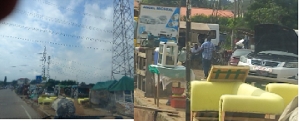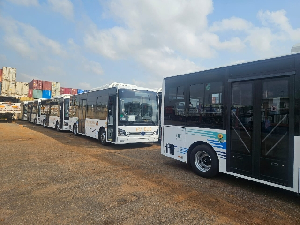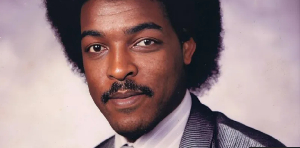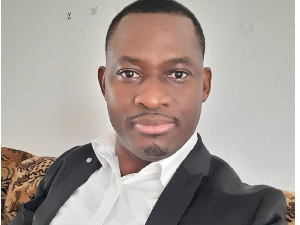Every human being deserves a comfortable life under a decent shelter and that is a right under Ghana’s 1992 constitution. Ironically, people living under the highly powered electric transmission lines in Accra cannot be described as having decent shelter though they claim to be living in tranquility.
It is estimated that over ten thousand artisans and traders are living and working under the high-tension electricity transmission lines in the Greater Accra region alone. These include vehicle and motorbike mechanics, welders, vulcanizers, car sprayers, carpenters, food Vendors, and among other encroachers.
These encroachers have built makeshift wooden and metal structures under high-voltage transmission lines. The transmission lines are estimated to be transporting hundreds of thousands of megawatts of electric power from the Akosombo Dam and the other power plants in Tema to other parts of the country. The continuous stay of these squatters or encroachers under the transmission lines keeps their lives at high risk. Their lives can be described as not precious at all; belittling the adage that says "life is precious".
For them, life cannot be precious but risky since they could die at any time disaster strikes. Despite the conspicuous danger around them, these illegal occupants or encroachers seem calm and go about their businesses without fear or panic. They seem not petrified by the deadly noise that emanates from the electrical wires transmitting the electrical power. Almost all of these people working and operating under the transmission lines sleep in their makeshift structures.
The structures serve as their home. They live there with their wives, husbands, children, concubines, friends, masters, and apprentices among others. The encroachment stretches from Ashaiman through American house, East Legon over the Gulf House enclave through Achimota, and across, Kwashieman Awoshie towards Kasoa in the Central Region.
Awudu Ali is a 47-year-old motorcycle mechanic who lives and works in one of the makeshift structures under the deadly transmission lines at Mempeasem near East Legon.
In an interview, Awudu Acknowledged the danger that the lines posed to his life and health but said he had no option since he had nowhere to go.
"I have lived under these transmission lines for about eight years now and once in a while the VRA, GRIDCO, POLICE, AND the Military will come and demolish our structures. When we hear of them or see them coming we will go and hide and after the demolishing, we return to rebuild our demolished structures and continue with our business, we have nowhere to go, as you can see, we are many and I can tell you that the taskforce is even tired of pursuing us and therefore have stopped chasing us.
When they demolish our structures ten times we will return and rebuild ten times and continue with our business until they decide to relocate us to a safe place but the government is not ready to do that", he stated.
Alhassan Yussif, a bicycle repairer also in an interview said “I have been working here for about four years. This is where I sleep and work. I have nowhere to go I came from the north and I didn’t have money to go and rent so I survive here. I started as a mechanic apprentice and now doing ‘work and pay’ casual job for my master and I am ok working here. Over here, I don’t pay rent or any electricity bill. All I have to pay for is food.”
When asked if he wasn’t afraid of working under the high tension which could kill him, should there be an accident, he said: How and why should I be afraid? As humans, we are all at risk and could die at any time so as and when it comes I work and wait for it”.
Meanwhile, some energy risk analysts have suggested to the government and stakeholders to intervene and get rid of the encroachers before disaster strikes.
Interview with Dzifa Bampoh:
Dzifa Bampoh is the Director of Public Affairs at the Ghana Grid Company Limited, owner and manager of the Transmission lines.
According to her, “People are not supposed to live there. I am glad they told you we come and demolish occasionally so the problem is with the people (encroachers) and their refusal to just adhere to our rules. These high-tension lines are transmitting 330,000 volts. It’s not a simple one that if you put your hands in the sockets then you get a mild shock.”
“Our responsibility is what we continue to do which the people have told you. We demolish them but they come back and put them up and look at the work we do. It is nationwide, we have 12 operational areas from Accra to Tumu, WA, and Bawku. So the truss of the matter is that these lands are assigned to us for this work. If the transmission cable snaps right now anybody within that vicinity will die and we have done this education time without a number. Because people have lived there and nothing has happened to them they don’t think it’s an issue”.
“I think you have been unfair to us because the people have told you that they demolish them and they come back. Didn’t you see that they are rather creating problems? We have about 7000 kilometers of transmission lines across the country and if we are to recruit people to patrol these lines, it will be like a police state. In other places, other countries, people know that this is a high-tension cable, they respect the rules and so they don’t live there. In July or June 2022, we went and demolished that place but to show you how fearless people are, even deep in the night they were left in the rubble so this is a national security matter.it is beyond GRIDCO now.”
“The point is to ask yourself if GRIDCO has been doing this and how much have they spent. We demolish these places like 5 times a year. Like last year September, we did a demolishing at Fiesta Royal, Ashaiman American house. Yes, we do it. Myself, last year September 2023, I spent one month at Asiamah in the Western Region. Do you know what they were doing in Asiamah, they were actually cutting the transmission lines and selling them.”
“A few people had died. It just tells you our people are just refusing to do the right thing. Also, we are not helped by the district assemblies and the politicians who go there to campaign. So the issue has become unfortunately a complex one. Me, I don’t wish anyone bad but I can’t tell you for a fact that it had been the hard work of our lines, maintenance, and engineering team. If this had been other banana republic err, the transmission lines, they will just leave it so that when it drops and people die, then people will know not to live under it.”
“This is true that when disaster happens GRIDco will be blamed but at the end of the day, the evidence will show that we have done a number of things and people have refused to adhere. The way the blame goes is because when people die they value the dead more than the living, if people value their lives why are they there? That is the question you should be asking them. Sometimes people want to turn it and say that GRIDco should compensate them for their relocation, but I can tell you that this will not solve the problem and the truth is if GRIDco is to compensate people, this company will collapse. Let me open the law and quote for you. We are allocated this land by law otherwise how would they have electricity? Electricity is a public good. And that is the work we do.
"GRIDCO is indebted to the tune of 3 billion dollars and more because we have to do this project and because there are revenue streams that have not been honoured by the government so this has nothing to do with we should give people compensation. We are already providing a public good almost for free.”
“The infrastructure, if you look at the Kasoa substation for instance, you should go and ask how much it costs, they will quote something not less than US$20 million dollars. Same with the Pokuase substation, even the line, there is a line from Accra to Kumasi, Techiman to Tamale and then it breaks to Bolga and WA. These help in the export of power to Burkina Faso. Do you know how much that cost us to do, 173 million Euros? Yes, and these are debts we continue to pay. So it’s really unfair when people say that GRIDco should give us something so we go. So for me, the solution should be that National security has to come in and drive people away, We need to bring in the military and national security to drive people away and it has to be a consistent activity sanctioned by the state. The thing is out of hand as we speak. They are not just sleeping, they are doing welding, cooking, etc. which is dangerous. We need state intervention to end this menace".
General News of Tuesday, 5 March 2024
Source: Kwabena Adu Koranteng, Contributor
Living under the power of death: How thousands of Ghanaians risk their lives living under high-voltage transmission lines
Entertainment
















